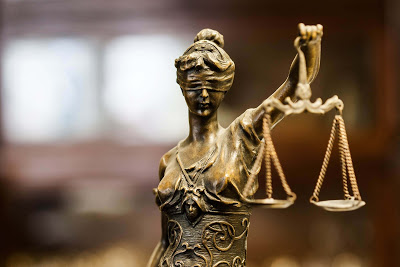
Our founding fathers and our powers-that-be have opted
for the rule of law in preference to the rule of force and absolute totalitarianism.
for the rule of law in preference to the rule of force and absolute totalitarianism.
– Nnaemeka – Agu JSC;
A.G Bendel V.
Aideyan(1989) 4 NWLR (Pt. 118)671[i]
Aideyan(1989) 4 NWLR (Pt. 118)671[i]
The term “Rule of Law” is one used very
often. To the Nigerian layman, it sums up to his or her ability to exercise the
legal rights and freedoms guaranteed by the Constitution; it also includes the
access to quick and fair dispensation of justice. In Nigeria, all governments
come into power with the promises of strengthening the rule of law and to look
out for the common man. The reality however is not the case, for if you carried
out an opinion poll, you will discover that almost all Nigerians believe justice
is reserved only for the rich and powerful.
often. To the Nigerian layman, it sums up to his or her ability to exercise the
legal rights and freedoms guaranteed by the Constitution; it also includes the
access to quick and fair dispensation of justice. In Nigeria, all governments
come into power with the promises of strengthening the rule of law and to look
out for the common man. The reality however is not the case, for if you carried
out an opinion poll, you will discover that almost all Nigerians believe justice
is reserved only for the rich and powerful.
Despite the current state of the justice
administration system in Nigeria, the rule of law cannot expressly be
jettisoned while we all embrace anarchy. It is through the propagations of the
rule of law that we will build our society, our democracy and our government. One
may begin to question the exact definition of the rule of law at this point and
may even further wonder how it relates to the lot of the average Nigerian.
administration system in Nigeria, the rule of law cannot expressly be
jettisoned while we all embrace anarchy. It is through the propagations of the
rule of law that we will build our society, our democracy and our government. One
may begin to question the exact definition of the rule of law at this point and
may even further wonder how it relates to the lot of the average Nigerian.
The
term rule of law was coined by A.V Dicey in his book, “Law of the Constitution”10th
Edition, published in 1885, to mean the –
term rule of law was coined by A.V Dicey in his book, “Law of the Constitution”10th
Edition, published in 1885, to mean the –
“the absolute supremacy or predominance of regular law
as opposed to the influence of arbitrary power, and excludes the existence of
arbitrariness, of prerogative or even of wide discretionary authority on the
part of government”[ii].
as opposed to the influence of arbitrary power, and excludes the existence of
arbitrariness, of prerogative or even of wide discretionary authority on the
part of government”[ii].
(Emphasis Mine)
To further understand what the term rule
of law means, Sir Adetokunbo Ademola, first indigenous Chief Justice of Nigeria
stated that, “as soon as you accept that Man is governed by law and not by
whims of men, it is the rule of law”. To put it simply, the rule of law means
that as Nigerians within the territorial space of our nation, we should be
governed by a system of laws and that such laws must be supreme. That our justice system should be efficient as opposed to being governed by decisions
of individual government officials.
of law means, Sir Adetokunbo Ademola, first indigenous Chief Justice of Nigeria
stated that, “as soon as you accept that Man is governed by law and not by
whims of men, it is the rule of law”. To put it simply, the rule of law means
that as Nigerians within the territorial space of our nation, we should be
governed by a system of laws and that such laws must be supreme. That our justice system should be efficient as opposed to being governed by decisions
of individual government officials.
In
Nigerian history, the greatest enemy of the rule of law, as always been the
government and its officials. In this regard all governments, whether past or
present are inclusive. The political class has always unscrupulously shelved
the rule of law for their personal gains and whims, usually bending the law to
act in their favour and applying force to cement their acts and silence public
criticism. This situation is aptly put by Denton West JCA in the case of
Balonwu V. Obi (2007) 5 NWLR (Pt. 1024) 563, where Milord stated that, “indeed
for politicians, the rule of law is non-existing until it suits their purpose,
and it is only then it is observed to the letter”.
Nigerian history, the greatest enemy of the rule of law, as always been the
government and its officials. In this regard all governments, whether past or
present are inclusive. The political class has always unscrupulously shelved
the rule of law for their personal gains and whims, usually bending the law to
act in their favour and applying force to cement their acts and silence public
criticism. This situation is aptly put by Denton West JCA in the case of
Balonwu V. Obi (2007) 5 NWLR (Pt. 1024) 563, where Milord stated that, “indeed
for politicians, the rule of law is non-existing until it suits their purpose,
and it is only then it is observed to the letter”.
Recently, the Attorney – General of the
Federation and Minister of Justice, Abubakar Malami (SAN) on the 7th
of November, 2017, raised hopes of a structural balance in the nation’s justice
delivery system, when he spoke on the new national policy on justice and how it
will mitigate the challenges of effective administration of justice in Nigeria. These raised hopes could however be dashed, as the national policy on justice is still at
the road map stage and may take a long time for same to come in
effect, let alone for its benefits to be felt by the average Nigerian.
Federation and Minister of Justice, Abubakar Malami (SAN) on the 7th
of November, 2017, raised hopes of a structural balance in the nation’s justice
delivery system, when he spoke on the new national policy on justice and how it
will mitigate the challenges of effective administration of justice in Nigeria. These raised hopes could however be dashed, as the national policy on justice is still at
the road map stage and may take a long time for same to come in
effect, let alone for its benefits to be felt by the average Nigerian.
It is however important to point out, that
if we must strengthen the rule of law in Nigeria, the Judiciary must truly be
independent in funding and in administration. The powers of the State Governor
and the President over the funding of the judiciary at all levels must be
removed and the Judiciary should be truly empowered to deliver justice as it
deems fit to the average Nigerian. All policies of government that does not
first address the issue mentioned above is merely a present relief to the sore
justice system but will deliver a long lasting solution.
if we must strengthen the rule of law in Nigeria, the Judiciary must truly be
independent in funding and in administration. The powers of the State Governor
and the President over the funding of the judiciary at all levels must be
removed and the Judiciary should be truly empowered to deliver justice as it
deems fit to the average Nigerian. All policies of government that does not
first address the issue mentioned above is merely a present relief to the sore
justice system but will deliver a long lasting solution.
It is our duty as Nigerians to always
strive for the promotion of justice and the rule of law at all levels. That our
laws be upheld and no Big-Man be allowed to escape through the nets of justice
while the poor suffer innocently. It is our obligation, not only for ourselves
but also the future generations.
strive for the promotion of justice and the rule of law at all levels. That our
laws be upheld and no Big-Man be allowed to escape through the nets of justice
while the poor suffer innocently. It is our obligation, not only for ourselves
but also the future generations.

Adedunmade Onibokun
Lawyer & Author
